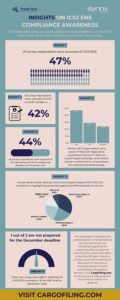“As President of Trade Tech, I’ve seen how regulatory advancements like the European Union’s Import Control System 2 (ICS2-ENS) reshape global trade. ICS2-ENS isn’t just a new compliance requirement; it’s a foundational shift towards a more secure and efficient supply chain,” notes Seattle, Washington-based Bryn Heimbeck, President and Co-Founder, Trade Tech.

The alignment of these regulatory processes for international trade creates an effective process and data standard for both global as well as local importers and global traders. So, the question now becomes: “How do importers and global traders take advantage of this regulated data flow?”
Here’s why ICS2-ENS matters, how strict data rules ensure accuracy and operational fluidity, and how Trade Tech can help you stay ahead.
The significance of ICS2-ENS
ICS2-ENS represents a game-changing transformation in how we manage international cargo, drastically altering the landscape of global trade. By mandating that all Bill of Lading information be submitted to EU Customs 24 hours before cargo is loaded, ICS2-ENS enhances visibility, accuracy, and standardization across the supply chain.
This advance notice enables more precise tracking and better decision-making, ultimately leading to greater efficiency and reduced delays. For businesses engaged in global trade, embracing ICS2-ENS is crucial for maintaining a competitive edge and ensuring compliance with the evolving landscape of customs regulations.
Ignoring ICS2-ENS can lead to severe consequences, including hefty fines for data inaccuracies and potential disruptions in cargo flow. The system’s rigorous data accuracy requirements and its alignment with international standards underscore the need for businesses to adapt proactively.
Implementing robust compliance measures and leveraging advanced technologies will not only help avoid financial penalties but also streamline operations and enhance overall supply chain performance. In a world where timely and accurate information is key, taking ICS2-ENS seriously is essential for safeguarding your business’s future in global trade.
Visibility in the Supply Chain
ICS2-ENS turns the concept of visibility from a buzzword into a practical tool. By requiring detailed shipment data in advance, it provides a comprehensive view of cargo from loading to discharge.
This early notice improves tracking and offers stakeholders actionable insights into their cargo’s journey, ultimately facilitating better decision-making and enhancing operational efficiency.
The imperative of data accuracy and completeness
Visibility alone isn’t enough; accurate and complete data is crucial. While penalties for non-compliance have not been finalized for ICS2-ENS, similar regulatory requirements impose strict penalties—up to US$5,000 per shipment—for data inaccuracies or omissions.
This regulatory pressure underscores the need for precise data submission. Errors or incomplete information can lead to severe fines and compliance issues, making data integrity a cornerstone of smooth supply chain operations.
The role of data standardization
ICS2-ENS’s focus on data standardization is another critical aspect. It mandates a uniform data submission format to a single EU Customs authority, ensuring consistency across all industry participants—carriers, NVOCCs, forwarders, terminals, and brokers.
This standardization simplifies compliance, reduces errors, and improves operational efficiency. ICS2-ENS also aligns closely with the World Customs Organization Data Protocol, suggesting potential for further global harmonization in trade regulations.
Customs clearance and managing congestion
ICS2-ENS also addresses Customs clearance timing, allowing pre-arrival clearance and better congestion management at ports. To support this, service providers need to send shipment data to Customs brokers via electronic methods immediately after vessel departure.
Real-time data transfer enables brokers to prepare for prompt customs clearance, reducing delays and enhancing overall efficiency.
The Future: Automated Customs clearance
With technological advancements, Customs clearance could soon be automated based on pre-classified SKUs and commercial invoices. This automation promises to streamline processes, minimize manual intervention, and further accelerate global trade efficiency.
How Trade Tech can help prepare for the December 2024 Deadline
At Trade Tech, we provide global support and local expertise to guide businesses through ICS2-ENS compliance. Our extensive network delivers timely, region-specific assistance, while our AWS-hosted cloud system integrates sales, operations, accounting, and security.
With built-in accuracy checks and real-time sailing schedule tracking, our platform simplifies filings and reduces administrative tasks. We handle a variety of security filings, including ICS2-ENS, AMS, ACI, and e-Manifest, managing multiple submissions simultaneously to ease compliance and keep cargo moving.
Conclusion
ICS2-ENS is more than just a regulatory change—it is a major step towards a more transparent, accurate, and efficient global supply chain. By enforcing strict data requirements and aligning with international standards, ICS2-ENS addresses key industry challenges and sets the stage for future advancements in Customs processes.
Trade Tech is here to guide the industry through this transition, offering expertise, advanced technology, and comprehensive support. As the December 2024 deadline approaches, we’re ready to help our customers adapt seamlessly and maintain their competitive edge in an evolving regulatory landscape.
